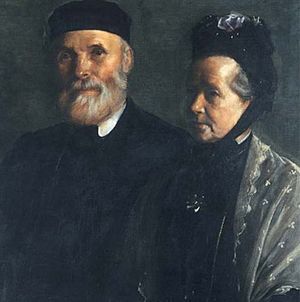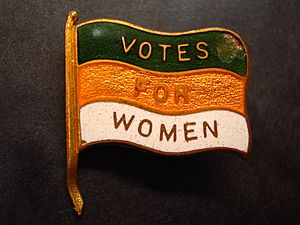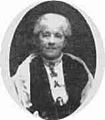Anna Haslam facts for kids
Quick facts for kids
Anna Haslam
|
|
|---|---|
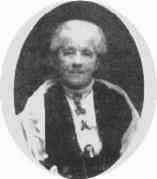 |
|
| Personal details | |
| Born |
Anna Maria Fisher
1829 Youghal, County Cork, Ireland |
| Died | 1922 (aged 92–93) Dublin, Ireland |
| Spouse | Gavin Craven (1825–1917) |
Anna Maria Haslam (born Fisher; 1829–1922) was a very important person in Ireland. She worked hard to get women the right to vote. She was a leader in the women's movement in the 1800s and early 1900s.
Contents
Anna Haslam's Early Life
Anna Maria Fisher was born in Youghal, Ireland, on April 6, 1829. She was the 16th of 17 children in her family. Her parents were Jane and Abraham Fisher.
The Fishers were a Quaker family. Quakers are a Christian group known for their peaceful beliefs. The family had a business in Youghal. They were known for helping others, especially during the Great Famine.
Anna helped in soup kitchens during the famine. She also helped local girls learn skills like lace-making and knitting. This helped them earn money. She grew up believing that men and women should be equal. She also supported campaigns against slavery, for less alcohol use, and for peace.
Anna went to Quaker boarding schools. These were Newtown School in County Waterford and Castlegate School in York. Later, she became a teaching assistant at Ackworth School in Yorkshire. This is where she met Thomas Haslam.
Anna and Thomas: A Partnership for Change
Anna and Thomas Haslam got married on March 20, 1854. They decided not to have children. They both strongly believed that men and women should be equal. Thomas supported Anna in all her campaigns.
Thomas Joseph Haslam was born in 1825. He was also from a Quaker family. Thomas was a writer who thought deeply about women's rights. From 1868, he wrote about many topics, including women's suffrage, which is the right for women to vote.
Both Anna and Thomas were asked to leave the Quaker community. This was because of their strong interest in social reform. However, they still kept in touch with their Quaker friends.
Thomas Haslam passed away on January 30, 1917. He was 91 years old. Anna and Thomas were buried together. Their grave is in the Quaker burying ground in Temple Hill, Dublin.
Fighting for Women's Rights
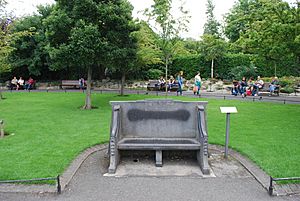
Anna Haslam is best known for her work to get women the right to vote. She was a leader in almost every women's rights campaign in Ireland in the 1800s. She started fighting for women's votes in 1866.
Anna and Thomas Haslam helped start the Dublin Women's Suffrage Association in 1876. This group began an important campaign in Dublin for women's voting rights. Anna, with Thomas's writings, kept the campaign going.
In 1896, women in Ireland won the right to be elected as Poor Law Guardians. These were people who helped manage support for the poor. Irish women's rights activists worked closely with English groups. They faced the same unfair treatment in education, jobs, and politics.
The Dublin Women's Suffrage Association helped introduce a new law. This law would remove the rule that stopped women from being elected as Poor Law Guardians. When the law passed in 1896, the association quickly told people how to register to vote. They also encouraged women to run for election.
By 1900, nearly 100 women were Poor Law Guardians. Anna then led a campaign in 1898. This campaign encouraged qualified women to run for other local elections. Women won the right to vote in local government elections. They could also run for election as rural and urban district councillors.
In 1913, Anna stepped down as the secretary of the Association. She was then chosen as its life-president.
Major Achievements
Anna Haslam was involved in a petition in 1866. She helped gather 1,499 signatures. This petition asked for voting rights to be given to women as well as men. In 1867, more men got the right to vote. However, it wasn't until 1911 that women won the important right to run for election as local councillors.
In 1918, when she was almost 90, Anna went to vote. She was surrounded by flowers and flags. Women came together to celebrate this victory in her honor. This showed how united women activists were, no matter their political views. They all recognized her important role in the fight for the right to vote.
In 1922, the same year Anna died, the Irish Free State gave all men and women over 21 the right to vote.
Remembering Anna Haslam
A special memorial seat for Anna and Thomas Haslam was put in St Stephen's Green, Dublin, in 1923. It has words carved on it that say: "in honour of their long years of public service chiefly devoted to the enfranchisement of women."
Anna's name and picture are also on the base of the statue of Millicent Fawcett. This statue is in Parliament Square, London. It was revealed in 2018. Her name is there with 58 other women who supported women's right to vote.
Images for kids
 | Shirley Ann Jackson |
 | Garett Morgan |
 | J. Ernest Wilkins Jr. |
 | Elijah McCoy |


